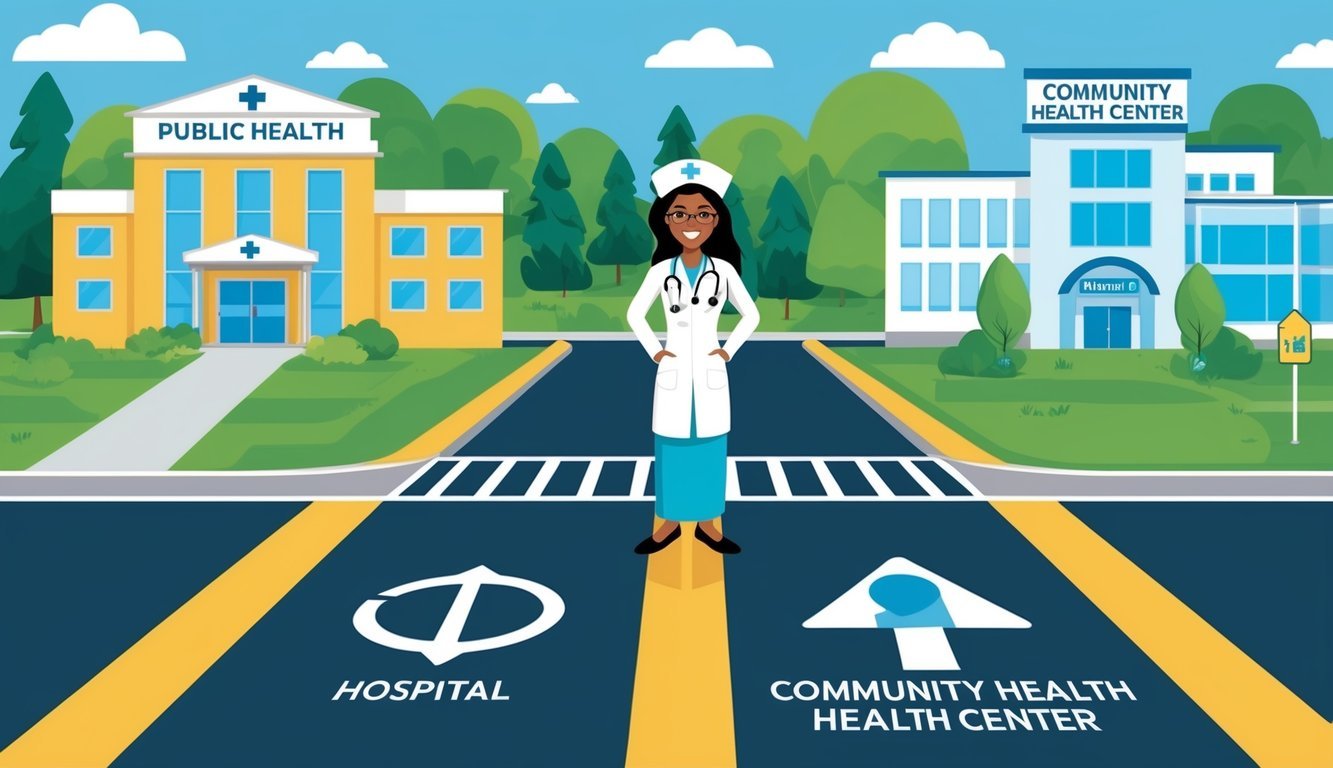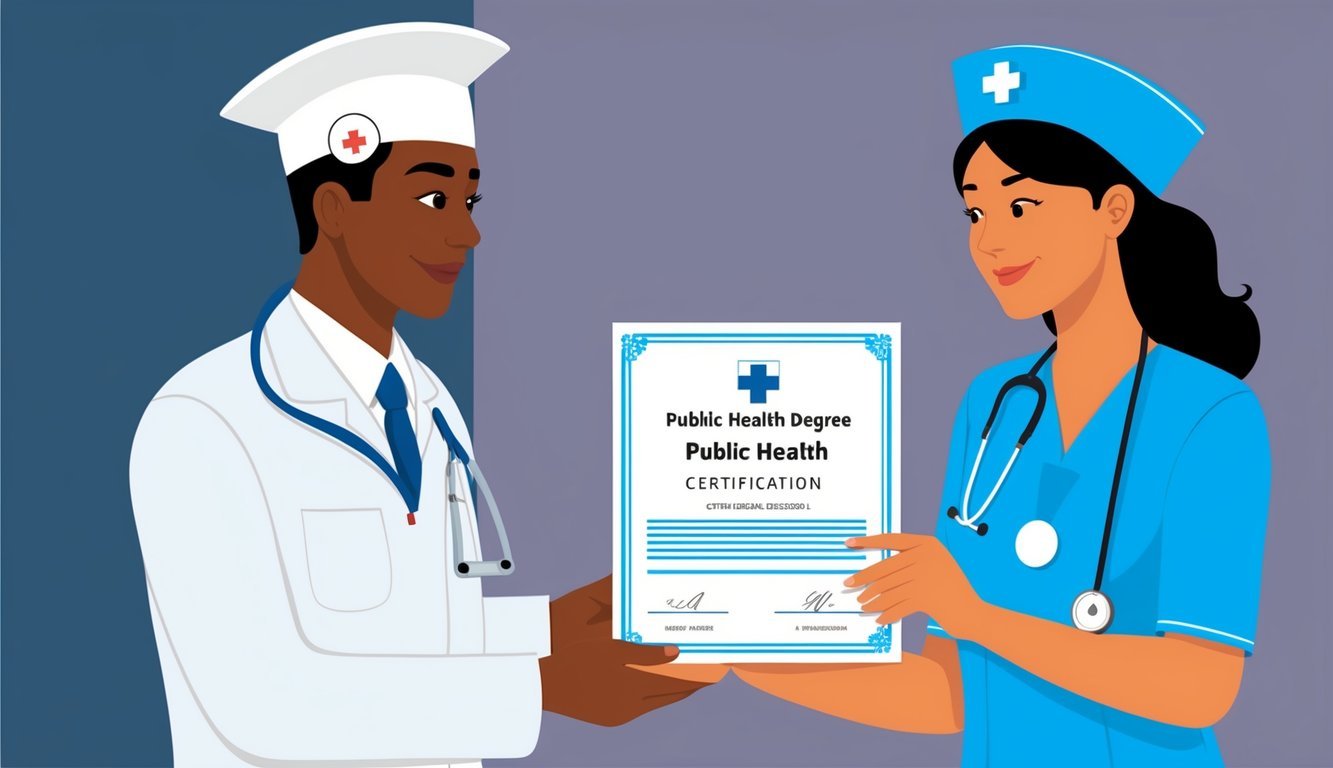A public health degree can open many doors, especially in the healthcare field.
Yes, you can become a nurse with a public health degree, but you will need additional education to meet licensing requirements.
This degree prepares you for various roles focused on community health, prevention, and education.
While a public health degree provides valuable knowledge about health systems and populations, becoming a registered nurse (RN) typically requires a nursing program, such as an Associate of Science in Nursing (ASN) or Bachelor of Science in Nursing (BSN).
Many public health professionals choose to further their education by enrolling in these programs to gain hands-on clinical experience.
If you’re considering a career in nursing with your public health degree, understanding the necessary steps will be crucial.
You can leverage your background in public health to excel in nursing roles that emphasize community care and health promotion.
Key Takeaways
- You can transition from a public health degree to nursing with further education.
- A registered nurse must complete a nursing program to gain licensure.
- Public health knowledge enhances your ability to work in community health nursing roles.
Educational Pathways to Nursing

Several educational pathways can lead you from a public health degree to a nursing career.
Understanding these options will help you choose the best route for your goals in healthcare.
From Public Health Degree to Nursing
If you hold a public health degree, you can take specific steps to transition into nursing.
Many public health programs provide a strong foundation in health systems and community health, which is valuable in nursing.
From your degree, you may pursue a Bachelor of Science in Nursing (BSN), which is often preferred by employers.
This program typically requires the completion of a nursing-focused curriculum and clinical practice.
You might also consider an Accelerated BSN program if you have a bachelor’s degree in another field.
This can significantly shorten your education time.
Nursing Degree Options
You have several options when it comes to nursing degrees.
The main ones include:
-
Associate Degree in Nursing (ADN): This is a two-year program that prepares you to sit for the NCLEX-RN exam. Many community colleges offer this path, making it a popular and accessible choice.
-
Bachelor of Science in Nursing (BSN): A four-year degree that provides more in-depth nursing education. Most employers prefer or require a BSN for many nursing positions.
-
Master of Science in Nursing (MSN): If you wish to pursue advanced roles such as nurse practitioner or nurse educator, an MSN may be necessary. This program usually requires a BSN as a prerequisite.
Choosing the right nursing education program is essential to meet your career goals and licensure requirements.
Many programs are accredited, ensuring you receive quality education.
For more detailed information, you can refer to Nurse.org or Nursing Education.
Certification and Licensure

To pursue a career in nursing with a public health degree, you must complete certification and licensure requirements.
These processes include obtaining a public health certification and passing the licensing exam to become a registered nurse.
Public Health Certification
To qualify as a public health nurse, you can obtain certification in public health.
The Certified in Public Health (CPH) designation is awarded by the National Board of Public Health Examiners.
Eligibility requirements include:
- A bachelor’s degree in public health or a related field.
- A minimum of five years of public health experience.
The key areas tested in the CPH exam cover topics like epidemiology, biostatistics, and health policy.
The American Public Health Association also offers resources to help you prepare for this certification.
Nursing Licensure Process
To become a registered nurse (RN), you need to complete the nursing licensure process.
This begins with earning a nursing degree, typically a Bachelor of Science in Nursing (BSN).
After obtaining your degree, you must pass the NCLEX-RN exam, administered by the National Council of State Boards of Nursing.
Steps in the RN licensure process include:
- Apply for licensure in your state.
- Register for the NCLEX-RN exam.
- Prepare for the test, using resources from organizations like the American Nurses Credentialing Center.
Passing the NCLEX-RN exam allows you to obtain your RN license, enabling you to practice nursing professionally.
Public Health Nursing Roles
Public health nurses play vital roles in promoting community health and preventing diseases.
They work in various settings and specialize in different areas to meet the health needs of populations.
Scope and Responsibilities
Public health nurses focus on promoting health in communities.
Their responsibilities include conducting health assessments, developing health programs, and educating the public on health issues.
You may collaborate with community health workers, government organizations, and local health departments to address community concerns.
Key tasks include:
- Health Education: Educating individuals and groups on topics such as nutrition and disease prevention.
- Screenings: Performing screenings for various health issues, including chronic diseases.
- Policy Advocacy: Advocating for policies that promote public health and access to care.
- Data Collection: Gathering and analyzing data to identify health trends and target interventions.
These activities ensure that you contribute to the overall health of the community, focusing on prevention and education.
Work Environments and Specialties
Public health nurses can work in diverse environments.
Your workplace can range from health departments to correctional facilities, outpatient clinics, and voluntary organizations.
Common settings include:
| Environment | Role |
|---|---|
| Health Departments | Coordinate community health initiatives and provide health services. |
| Outpatient Clinics | Offer preventive care and manage chronic illnesses. |
| Voluntary Organizations | Engage in health promotion and education programs. |
| Correctional Facilities | Provide health care services to inmates and educate staff. |
Specialties in public health nursing may include community health nursing and epidemiology.
Each specialty allows you to focus on specific health issues, giving you the opportunity to make a significant impact in your field.
For more resources and support, you can explore the Association of Public Health Nurses.
Skill Set and Expertise

In public health nursing, a specialized skill set is vital for addressing community health challenges.
Your expertise will encompass core competencies and an ongoing commitment to education, ensuring effective practice in various public health roles.
Core Competencies in Public Health Nursing
Public health nursing requires a blend of skills that focus on community well-being.
Here are key competencies you will develop:
-
Advocacy: You will advocate for health policies that benefit communities. This includes supporting vulnerable populations to access healthcare services.
-
Disease Prevention: Understanding disease transmission is crucial. You will engage in activities such as immunization campaigns and health screenings to minimize outbreaks.
-
Health Education: Teaching communities about health risks and preventive measures is essential. You will create programs to inform and empower individuals regarding their health.
-
Epidemiology: You will analyze health data to identify trends. This skill helps you respond effectively to disease outbreaks.
-
Patient Care: While the focus is often on communities, you will still provide direct care when necessary, ensuring individuals receive appropriate health services.
For more on public health competencies, visit Nurse.org.
Importance of Continuing Education
Continuing education is essential for public health nurses.
The healthcare landscape evolves rapidly, and you must stay current with the latest practices.
Here’s why it matters:
-
Evidence-Based Practice: You will learn to apply the latest research to ensure that your interventions are effective.
-
Health Informatics: This area is growing. You need to understand how to use technology and data to inform health decisions and improve patient outcomes.
-
Health Promotion: Ongoing training helps you design and implement health promotion strategies tailored to community needs.
-
Skill Development: Specializations in areas like maternal and child health or chronic disease management can enhance your effectiveness.
Engaging in workshops and obtaining certificates can significantly increase your expertise.
For resources, check RegisteredNursing.org.
Career Outlook and Advancement

The career outlook for public health nursing is promising, with various opportunities available in the job market.
As you consider this path, it’s essential to understand salary expectations and how to advance in your career.
Job Market and Salary Expectations
The demand for public health nurses remains strong due to a growing focus on community health and preventive care.
In many regions, especially in underserved communities, there is a critical need for healthcare professionals who can support at-risk populations.
Salary Overview:
| Experience Level | Average Salary |
|---|---|
| Entry-Level (0-1 years) | $50,273 |
| 1-4 Years | $63,432 |
| Experienced | $71,803 |
Public health nursing jobs often offer salaries above the national average, particularly in states like California and New York.
Understanding these figures can help you negotiate effectively when seeking employment.
Advancement Opportunities in Public Health Nursing
Advancing in public health nursing often requires pursuing further education and certification.
One desirable credential is the Certified Public Health Nurse (PHN) designation, which can enhance your qualifications.
You might also consider a Doctor of Nursing Practice (DNP) for higher-level roles.
With additional education and experience, you can move into leadership positions, focusing on policy development or health program management in various settings.
Frequently Asked Questions

This section addresses common questions about transitioning from a Public Health degree to a nursing career.
It covers educational requirements, online program availability, salary expectations, state-specific processes, accelerated program options, and complementary degrees.
What are the educational requirements to become a Public Health Nurse?
To become a Public Health Nurse, you typically need a Bachelor of Science in Nursing (BSN).
Some programs may allow those with a Public Health degree to enter nursing roles after completing specific nursing coursework.
Additionally, you must pass the NCLEX-RN exam to obtain your nursing license.
Are there online programs available to transition from a Public Health degree to a nursing career?
Yes, many universities offer online RN-to-BSN programs designed for those with a Public Health background.
These programs can provide the necessary nursing training while allowing you to study remotely.
Research accredited online options that fit your schedule and educational needs.
What are the salary expectations for Public Health Nurses compared to other nursing specialties?
Public Health Nurses typically earn between $50,710 to $66,510 annually, depending on experience.
This salary may differ from other nursing specialties, which can range from $60,000 to over $100,000, based on specialization and location.
Consider researching specific salaries for various nursing roles for a better understanding.
What is the process to become a Public Health Nurse in specific states, such as California?
In California, you must complete a nursing program, obtain a BSN, and pass the NCLEX-RN exam.
Additionally, California requires completing the state’s public health nursing certificate program to work specifically in public health.
Each state may have different requirements, so check the regulations for the state you wish to work in.
Can an individual with a Public Health degree enroll in accelerated nursing programs?
Yes, individuals with a Public Health degree may qualify for accelerated nursing programs.
These programs typically cater to those who have earned a bachelor’s degree in a related field.
You will need to meet specific prerequisites and apply to the programs that align with your educational background.
Which additional degrees complement a Public Health background for a career in nursing?
Complementary degrees include a Master of Science in Nursing (MSN) or a Doctorate in Nursing Practice (DNP).
These degrees can enhance your knowledge and skills in nursing leadership or specialized fields.
Combining these degrees with your Public Health background can open more career opportunities within healthcare settings.

